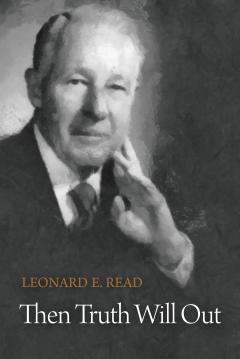The Foundation for Economic Education was founded by Leonard E. Read in 1946:
This month marks the 75th anniversary of the Foundation for Economic Education. As I have benefitted from reading FEE’s literature for nearly two thirds of that time and contributed to it for decades, I feel that it is definitely worth celebrating.
This year is also the 50th anniversary of Then Truth Will Out, by Leonard Read, FEE’s founder, which he wrote involved “An assessment of position on the freedom road after passing the 25th milestone at FEE.”
That sort of compound anniversary — 25th, 50th and 75th rolled into one — suggests that we might profit from a look back at “the freedom road” with Then Truth Will Out.
I think it is one of Read’s best books, as attested to by the fact that four of the chapters in my Apostle of Peace, which discusses what I consider some of his best sustained arguments, derive from it. But in looking at the book now, I have been most struck by its opening chapter, “A Confession of Faith.”
- Perhaps the clearest way to identify one’s politico-economic position — at least in broad outline — is to reveal his idea of the ideal, that is, what he means by civilization or by a civilized people.
- To me, civilization can mean nothing less than a society of civilized people. So how is a civilized person to be identified?
- A civilized person, according to my ideal, must recognize that man is at once a social and an individualistic being.
- Thus, he must not only be self-responsible but, at the same time, understand that he owes to others no infringements on their rights.
- In a word, the truly civilized person is a devotee of freedom; he opposes all man-concocted restraints against the release of creative human energy.
- The civilized person realizes how incorrect it is to think of freedom as synonymous with unrestrained action.
- Freedom does not and cannot include any action, regardless of sponsorship, which lessens the freedom of a single human being. To argue contrarily is to claim that freedom can be composed of freedom negations, patently absurd.
- Unrestraint carried to the point of impairing the freedom of others is the exercise of license, not freedom. To minimize the exercise of license is to maximize the area of freedom.
- In order to achieve this ideal, it is necessary that there be an agency of society — representative of the social side of man — which codifies the thou-shalt-nots, the taboos, the destructive actions and enforces their observation.
- The fact that society’s agency — government — has a historical record of getting out of hand, of becoming destructive itself, only testifies to how far from civilized we are. It does not warrant discarding the idea of the ideal; it does not justify anarchy.




